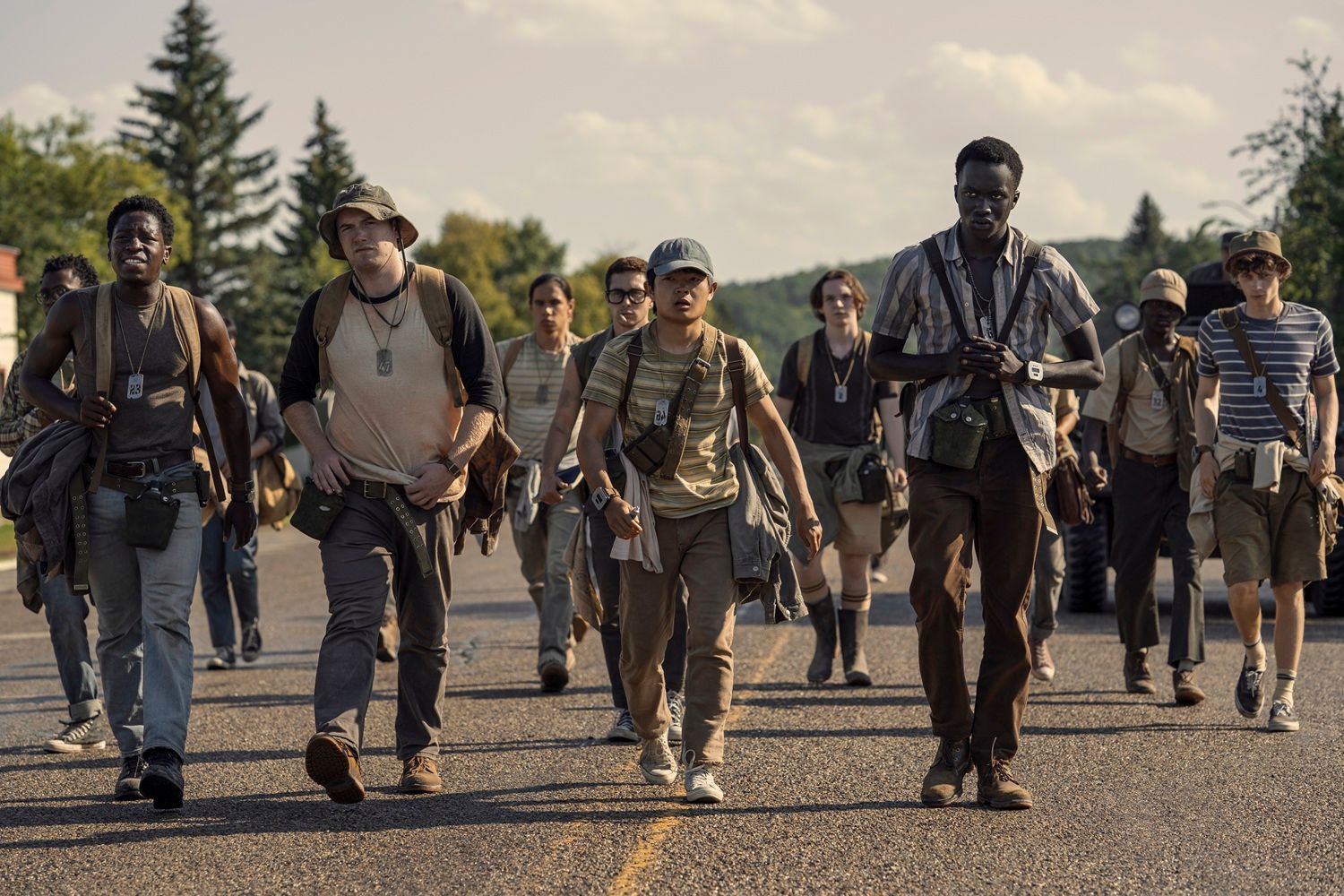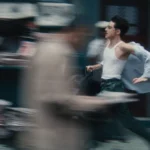Before Carrie, the book that would make him famous in his late twenties, Stephen King wrote in college The Long Walk, a dark dystopian tale about a group of one hundred boys who enter a life-or-death competition in a bid to win a cash prize and a single wish. The goal? Be the last man walking. Go under the speed limit of 4mph and you get a warning. Three warnings and you’re shot. Tense and nightmarish, The Long Walk is a stunning piece of work, a reflection on life and death, free will, and the absurdity of existence (many have seen it as an allegory for the Vietnam War), as its protagonist Ray Garraty embarks on his gruelling journey, presided over by the sinister Major. It seems implausible, reading this book, that it would carry well to the screen – after all, it’s mostly a group of lads talking, fighting, and walking for over three hundred pages, with action and death chopped up by Garraty’s voiceover pondering his existence, his choices, his meaning. Yet, Francis Lawrence, the man behind The Hunger Games adaptations, achieves the improbable with his rendition of the master of horror’s first musings: a version of The Long Walk that is an homage to the original (though with Lawrence at the helm, it has a distinctively “young adult dystopia” feel to it), but that allows for the exploration of a key theme in the competition, almost underdone in King’s novel – brotherhood.
Cooper Hoffman stars as Garraty, the determined, dutiful protagonist who we meet attempting to pry himself out of his mother’s (Judy Greer) pleading arms. There is little information about the background of the Walk – while there are references to a “backout day”, and it becomes clear that all the boys are there by choice, next to no time is spent on the minutiae of the administrative or historical details of the competition. Those watching might be somewhat disappointed – yet King’s novel is also quite cryptic about this, referencing only one or two winners, and only three quarters of the way in detailing the lottery method used to select the Walkers and backups should any opt out. The Long Walk does not dwell on bureaucracy – it forces us into the here and now, with the boys (and actors) who must stay up to speed to Jeremiah Fraites’ groundbreaking soundtrack. Nor does it spend too much time on philosophical ponderings, which King’s novel is teeming with – without a voiceover, conversations around the absurdity of the Walk are left to brief moments of rebellion in which the boys are strong enough to express their principles, or to closeups of their faces when they realise that someone has, indeed, been shot. Garraty’s panicked overthinking, his longing for his girlfriend Jan (omitted in the film), for a body, anybody (references to Garraty’s potential repressed homosexuality are also missing), feelings of guilt, shame, fear – with little to showcase onscreen, Lawrence opts for a somewhat more overt approach. While some of it is heavy-handed (Garraty’s participation in the Walk is apparently to avenge his father, killed by the Major for reading and sharing old books and music), the comradery between the boys is a tour de force, one in part achieved by the friendships undeniably forged onset. Garraty quickly bonds with his fellow walkers, including the know-it-all Hank Olson (Ben Wang) and kind Art Baker (Tut Nyuot), both in novel and film. But it is with the intrepid Peter McVries (an excellent David Jonsson) that Garraty forms the strongest friendship of all, as both quite literally hold each other up and risk their own lives to save the other in times of need – the absurdity is slick and palpable here, as both know full well that only one can win. It is just that leaving it up to fate and retaining an ounce of humanity is more important to them. Garraty and McVries are a great duo in King’s novel, but it is in Lawrence’s rendition that they truly shine, largely down to Hoffman and Jonsson’s excellent performances and chemistry. Even with Olson and Baker, the film achieves something quite outstanding, a genuine hurt for characters at all stages that knots the stomach and shatters the heart. It works beautifully, simply in a very different way to the original. Yet, this is not to say that it is all-round faultless in its own right. While King’s book suffers from a case of too many characters, Lawrence trips up in his decisions to merge some of them in an attempt to cut down (amongst other things, the Walkers are numbered at fifty in the film, one per state). Inevitably, some characters lose their weight and sense with this tactic – in the book, Scramm is the odds-on favourite in Vegas, and tells Garraty that he has a pregnant wife at home. The strongest of the lot, he succumbs to pneumonia two thirds of the way through – absurd, considering he hadn’t been ill in ten years – and the boys all agree that whoever wins will financially support his wife. In the film, it is after Olson’s death that we find out he had a wife, Scramm having been omitted. There is a certain depth lost here, both in his absence and in the unconvincing notion that Olson was married. Nonetheless, it is Stebbins’ character that suffers most in the film. The original tells the story of a boy who says nothing, walks at the very back of the pack, and who heavily intimidates Garraty in his ability to stay calm and his occasional laughter at a particular conversation or death – the sage of the group, above it all, he is also almost like the devil, Garraty saying in both renditions that talking to him is like “talking to smoke”. Lawrence’s version of Stebbins (Garrett Wareing), Garraty’s foil, however, is quite unremarkable, a moody teenager whose physical strength seems to be his only noteworthy attribute – while so much of King’s novel is non-translatable to the screen, here Stebbins, with his cackles and jelly sandwiches, feels like a missed opportunity, something that could have been truly horrific. There is a sense, as a whole, that there is too little time for these characters, despite so many not making the cut – even Garraty and McVries suffer from limited characterisation at times, fuelled by archetypes and flashbacks of traumatic memories. There is no mention of McVries’ ex-girlfriend, who slashed him across the face with a knife, for instance – Lawrence’s McVries is almost faultless in nature, heroically coming to save Garraty multiple times, a selfless guardian angel who does not faulter once in step or morale. Meanwhile, Garraty is a lot more rebellious and action-driven, a far cry from the novel’s terrified, erratic protagonist, aimlessly walking, forever regretting. The film counterparts are smoother, less rough round the edges compared to King’s original, which sees them just as they are – desperate, flawed boys, with dark pasts and even darker presents.





